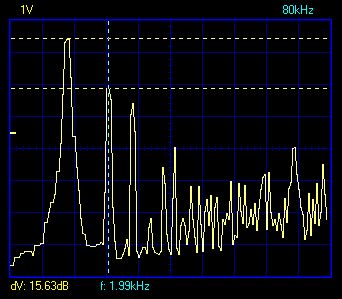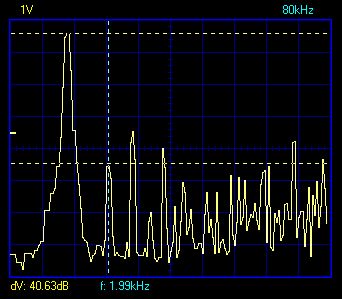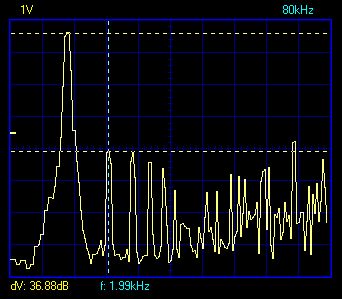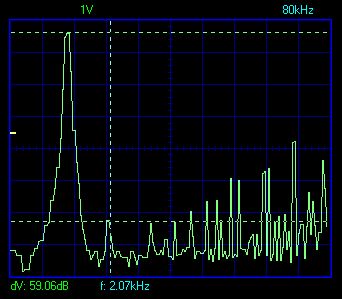

Updated:
02-Jan-06
DDDAC 1543,
Measuring and Listening Results !!!
Final Conclusion....
Introduction
At the other pages I have been
addressing already the absolute MUST to trim the TDA1543 in an optimum "bias"
state. I have seen on the WEB several designs with the TDA1543 and they seems to have
arbitrary values for Rref and Rload in their designs. May be not 100% arbitrary, but I
have seen no one actually discussing the importance of this theme, not even to mention do
listening tests with A-B comparison. Need to mention "measuring" ???
Well, challenge enough for me, to use my ears and FFT analyzer again !!!! And with stunning results I can say....... Keep on reading and find out why and how :-)
Measurements
So what I did, was using real arbitrary
values. I needed to start somewhere didn' t I? 2k7 for Rload and 1k2 for Rref. I
used 1kHz sinewaves from a test CD at full 0dB level and measured the distortion spectrum
as this is a direct result of the linearity of the DAC. My strong believe is, that the
distortion itself is not the problem, but the sheer fact the Digital to Analogue
conversion linearity varies. I experimented around with changing the value for Rref and
also for the Supply Voltage. It turned out, that there is a clear optimum and that there
is no wide range in which those values are giving valid results !!! Just a small turn at
the trimmer and I noticed immediate change in the distortion pattern...... It behaved like
a "notch-filter" small banded !!! This is actually asking for an individual trim
per DAC !!! OK, not everyone has a FFT, but you can start with the mentioned values and
tweak by carefully trimming around that point and find your favorite position.... I had
best results with the values mentioned in the circuits and VB at 8.5 Volt. The DC at the
output should be 3.85Volt..... lets check some details:
OK, I started with 5 Volt and 6 Volt supply voltage and the mentioned Rref and Rload. As you can see this resulted in un acceptable distortion for the 5Volt and unpleasant spectrum for the 6 Volt


At the left below, the same situation but now 7 Volt..... Things are clearly improving !! Turning the supply up to 8.5 Volt actually did nothing to this pattern, UNTIL I started turning the Rref trimmer !!! Depending on the Rref, you find all kind of improvements, but the best result was obtained with the mentioned values and the FFT result is shown at the right hand below........ Wow, When I saw the k2-k6 drop like that, I could not believe this at first.... Again it shows the DAC really needs individual trimming !


Below, just as an interesting aspect, I plotted a spectrum from the DAC, using a series of pulses, so also the spectrum above 20kHz will show up...... I will not go in deep theoretical backgrounds here, but with no oversampling, you will find that the response at the end of the 1/2 Fs spectrum is rolling off. Actually this is the typical sin(x)/x curve you expect. You clearly see the dip at Fs and the spectrum mirror above it. Also at 20kHz the roll off has a value of aprox -3dB as indicated in the graph. I must admit, I never noticed a lack of high frequencies, so it might compensate nicely the character of the DAC........

Listening
Before I come to describe the
sound-differences between the different configurations of the DDDA1543, I like to give a
general description of the sound character from this DAC. What impresses imedetially is
the very open dynamic sound, some times a bit brutal, but never aggressive. Even more
profound is the extreme pin point. In comparison with digitally filtered CD sound, the
last one is not so focussed, the instruments are fuzzy compared to the 1543, which is able
to paint a portrait of very high realism..... Any less great things??? Yes ! The 1543 is
lacking in the single DAC-chip version the smoothness of a filtered DAC and is on distance
in compared to SACD. This will improve when multiple chips are used........
Ofcourse I wanted to "check" the measured results with some listening tests. Although the differences are not HUGE, they are clearly noticeable and the more you arrive at the correct bias point, the more power full the sound becomes. Also female voices gain a lot, getting more natural, more smooth. If you are OFF-Optimum, the sound is getting a bit dull and is loosing the great power in the mid range....
I also did listening tests with the reclocking and multiple DAC's and interestingly, both address a different aspect of the sound reproduction. Now the 2 of them makes the DDDAC1543 play suddenly in a different class compared to the "Basic" version. What is it? The external clock makes the sound stage more precise, deeper, wider, better pin point. Typically low jitter results I would say.... The multiple DAC however, is adding a new level of detail in the music and at the same time improving the sometimes too direct and hard high frequencies. It is refining this to a point where SACD coming close. Still winning with extreme detail in the highs, but the multiple DAC totally looses any harshness you might find in the single version. This result already starts with 3 DAC's in parallel. With 8 the step is less spectacular, but still improves........
Clearly the teamwork of both aspects was for me the crown on the enhancements I wanted to make on the basic design..............
Conclusion
Actually, this small, cheap and easy to
build DAC is a slap in the face for all very expensive DAC's regardless if they are DIY or
Commercial..... Bolt statement eh? Ok, lets make things relative; I am not claiming this
is the best DAC available in the universe. I am sure there will DAC's which will score
better on some points, but as a total concept this little beast is not easily beaten. I
was shocked, it comes really close to SACD !!! This DAC just plays great music, very
dynamic, super sound stage, sometimes a bit direct and not extremely filigran, but I can
refrain from this easily as the rest is so extremely enjoyable !!! For the time being, I
don't think I will be quickly tempted to built another DAC. Certainly not one with digital
filters..... I have tasted the possibilities of the small underdog 1543, hahaha !!
Happy Listening and Building !!!!
Doede Douma
IMPORTANT: The information provided on this page is intended as guide for DIY activities and therefore free to copy and or publish. If any one wishes to use any of the information from my WEB site, please make sure to refer and footnote to my URL Link as source! Doede Douma